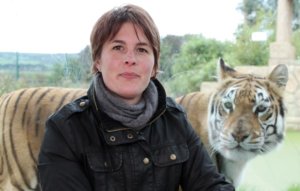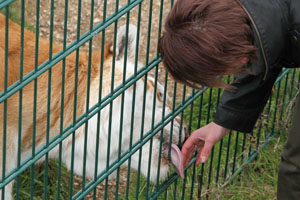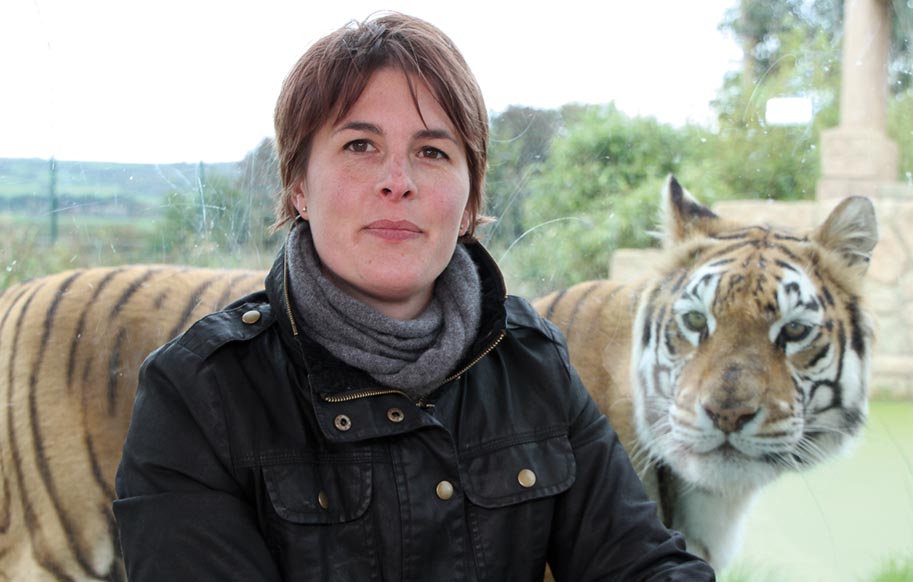 It was once the ‘slum zoo of Britain’. Then, by sheer force of personality, one man turned it into one of the Island’s premier draws for visitors. His daughter describes growing up with the animals, and her scheme for winter openings. For the first time Islanders can pay their furry friends a festive visit, Charlotte Corney tells Island Life.
It was once the ‘slum zoo of Britain’. Then, by sheer force of personality, one man turned it into one of the Island’s premier draws for visitors. His daughter describes growing up with the animals, and her scheme for winter openings. For the first time Islanders can pay their furry friends a festive visit, Charlotte Corney tells Island Life.
It’s Christmas time at the zoo. And yes, the monkeys’ dextrous fingers will open their stockings, and the tigers are partial to a bit of turkey. But this year, for the first time, it won’t be just the zoo keepers but the general public who can share the festivities, thanks to winter openings for the first time at the Isle of Wight Zoo.
“The staff can’t tell the animals they’re off to have their Christmas dinner,” says chief executive Charlotte Corney. “People think the animals hibernate and the staff go home. But actually it’s a really expensive time for us – bills are higher, the animals eat more and for three months there’s no income.”
It is not inappropriate that she sounds like a harassed mum trying to make the household ends meet. She has hand-raised many of the animals from cubs, and her commitment to sharing her Christmas with them is not just about economics. Charlotte has been part of the zoo since she was a cub herself. Many residents of Sandown will remember, just ten years ago, seeing Charlotte taking young and frolicsome tigers for a splash on Sandown beach; others might recall walking past her sister Emma, not more than four, pushing a pram in which was coiled a python.
That there is still a zoo here today is thanks to Charlotte’s father, Jack Corney, who began the slow and costly process of its rescue in the 1960s. Remarkably he was not a naturalist or a biologist, but a construction engineer with a company in Manchester. “He saw the zoo was up for sale and bought it,” says Charlotte.
His company was sold and the family brought to the Island, to a zoo in a desperate state. It was branded the slum zoo of Britain. The left-over exotic animal collection was in a miserable state and some individuals were beyond saving. Charlotte’s parents used to remark “at least the zoo has an excellent resident rat collection!”
Charlotte can’t explain what triggered her father’s interest in animals, but clearly feels that the zoo’s mission is to ignite similar commitment in others. Jack’s original plan was that the zoo should specialise in snakes, but realised that though they were his own passion they are not everyone’s cup of tea. “Then Twycross Zoo donated a young tigress in need of hand-rearing. Tamara was just weeks old – the first of many rescue cats. My mum hand raised her.”
 Jack was, says Charlotte, exceptionally visionary and determined: his wife Judith, you can’t help thinking, must be a candidate for sainthood at the very least. Raising tigers alongside two lively little girls was just the start of it. Bear cubs also had the run of the house: “Winnie and Ginny used to open the dishwasher and hide inside. They completely trashed the kitchen: they became so attached to it that when we eventually moved them to an enclosure in the zoo we had to move the kitchen furniture there as well!”
Jack was, says Charlotte, exceptionally visionary and determined: his wife Judith, you can’t help thinking, must be a candidate for sainthood at the very least. Raising tigers alongside two lively little girls was just the start of it. Bear cubs also had the run of the house: “Winnie and Ginny used to open the dishwasher and hide inside. They completely trashed the kitchen: they became so attached to it that when we eventually moved them to an enclosure in the zoo we had to move the kitchen furniture there as well!”
Naughty bears were one thing: a husband milking venomous snakes quite another. “He got bitten quite regularly,” says Charlotte. “Once mum was cooking and my dad wandered into the kitchen with his hand behind his back and said he was just popping out. She assumed he’d gone to the Crab & Lobster, until eventually she got a phone call from a journalist asking if she knew how her husband was getting on in intensive care!”
As for Charlotte, life was never run-of-the-mill. “There was that moment when you realised it’s not that normal for a leopard to be sitting in the passenger seat of your 2CV when your mum picks you up from school.” To concentrate on exams, she began boarding at Bembridge School, returning to find her bedroom was now “some sort of lemur lounge. I was given the keys to an old caravan.” She lived there for a few years, hand rearing tigers such as Zena, the zoo’s iconic white tiger, who had a habit of stalking Charlotte’s best friend when she came to stay. “Whenever Tina went to the house for a shower, wrapped in a towel, I’d hear this shriek, and Zena had leapt on her back!”
No wonder she says she can’t answer that question everyone asks: what would you be doing if not working with animals? She has always been an integral part of the zoo, acting, with her sister, as plants in the crowd when her father asked if anyone wanted to hold a snake. “It was to get the ball rolling. He was a great showman, in the mould of John Aspinal or Gerald Durrell.”
The zoo was more than showtime for Jack Corney, though. Enthusing others with his own passion for animals was his driving force. “I still have people who come back today and say they met my dad thirty odd years ago, and he transformed the way they felt about the natural world.”
 This is the baton which Charlotte is now running with, using the zoo to inspire others to love wildlife. What is more of a challenge now is continuing to employ her father’s hands-on approach. The health and safety protocol needed today to allow snake handling would drive her father to distraction, she says, and she is wistful that the immediacy of the connection is more difficult to achieve. “Now we have to work so much harder to generate the same kinds of feelings in people. They don’t remember facts about how many tigers are left in the wild or how you tell the difference between a jaguar and a leopard – they remember things that switch a light on, like seeing a tiger biting a wave on Sandown beach.”
This is the baton which Charlotte is now running with, using the zoo to inspire others to love wildlife. What is more of a challenge now is continuing to employ her father’s hands-on approach. The health and safety protocol needed today to allow snake handling would drive her father to distraction, she says, and she is wistful that the immediacy of the connection is more difficult to achieve. “Now we have to work so much harder to generate the same kinds of feelings in people. They don’t remember facts about how many tigers are left in the wild or how you tell the difference between a jaguar and a leopard – they remember things that switch a light on, like seeing a tiger biting a wave on Sandown beach.”
Her reaction when questioned about the morality of zoos is astonishing. “There isn’t a day that goes past when I don’t think ‘I’ve raised an animal from a cub and kept it in an enclosure’. It’s always a consideration but you’ve got to balance that with the overall benefit of zoos, a gene pool and a showcase for dying species.” She adds: “I feel you shouldn’t be doing this job unless you are constantly aware of these things. Besides, our animals enjoy care and expertise lavished on them.”
It is three years now since she took the helm, her father having bowed out extremely reluctantly following a stroke, and she has overseen the zoo’s regeneration following its television spotlight as Tiger Island. The logical extension is getting Islanders to embrace it as ‘their zoo’, rather than just an attraction for visitors, hence the winter weekend openings and special events like photography workshops. “It’s a more intimate experience without the summer crowds, it makes it that much more special,” she says. “This will be the Islanders’ time.”
For information about winter openings and events, contact Isle of Wight Zoo, Yaverland Seafront, Sandown, PO36 8QB. Tel: 01983 403883.



